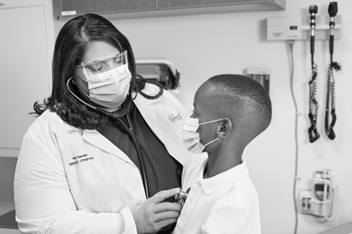The “Roving” Dental Clinic: Cleanings and Fillings in the Classroom?

A number of studies over last decade have shown that untreated dental issues cause children to miss millions of hours of school per year, sometimes with significant impact on their educational achievement. Children who come from families with low incomes experience this far more often than their peers.
To help address these concerns, Nationwide Children’s Hospital created a “roving” community dental clinic in 2021, which can set up quickly in empty school classrooms, conference rooms, staff lounges and other unused spaces to treat dental concerns. Over the last two years, the clinic has seen more than 1,000 children and performed more than 7,000 procedures.
“A large proportion of the students we’re seeing have never visited a dentist,” said Colleen Chenevey, an operations manager for Nationwide Children’s School Health Services. “We are caring for patients who really need care. And the goal is to provide all treatment they need, both preventative and restorative, before we move on to the next school.”
Nationwide Children’s school-based health programs are among the most robust in the United States, with 17 primary care clinics inside central Ohio schools, two mobile health clinics, roving vaccine clinics and a school-based wheelchair clinic. School-based asthma therapy and behavioral health services help thousands of children every year.
If children can’t get to a pediatrician or primary care provider for health services, Nationwide Children’s brings those services to a place where the children will be: at school.
It’s the same philosophy for the roving clinic, says Chenevey. The dental team will spend four to eight weeks at a single location. Five days per week, a dental hygienist provides cleanings and education. Two days per week, a Nationwide Children’s dentist and dental residents provide restorative treatment like fillings and crowns. Children who need more complex dental care are referred to the hospital itself.
While other hospitals also have school-based health dental services, utilizing permanent in-school clinics or mobile health units, Nationwide Children’s model may be unique in the way it can set up nearly anywhere with portable chairs and dental equipment, said Chenevey. Most of Nationwide Children’s roving clinic patients have been at schools, but the clinic has also been to Head Start locations and has the ability to set up in other community settings.
One of the most important aspects of the roving clinic is the staff’s ability to deal with young people with special challenges, said Chenevey. Nearly 40% of the patients seen so far have been diagnosed with a mental, behavioral and/or neurodevelopmental condition. The dental staff at Nationwide Children’s routinely treat children in the hospital who have complex needs, and that experience carries over to the roving clinic.
The initial funding for the clinic came through a five-year grant from the U.S. Health Resources and Services Administration. There seems to be enormous demand not only for this roving clinic, but for Nationwide Children’s to create other “roving” dental teams.
“There is a significant need for these services in the community, and our hope is to continue expanding to support those needs,” Chenevey said.
“A large proportion of the students we’re seeing have never visited a dentist. We are caring for patients who really need care. And the goal is to provide all treatment they need, both preventative and restorative, before we move on to the next school.”



